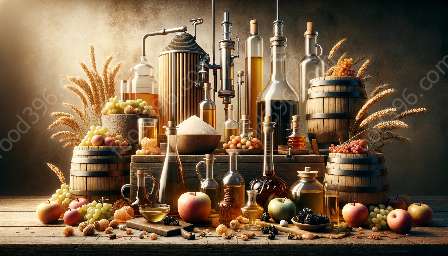Vinegar additives and flavorings play a significant role in the production, preservation, and processing of vinegar. In this comprehensive guide, we will explore the various types of additives and flavorings used in vinegar production and how they contribute to the preservation and processing of food.
Understanding Vinegar Production
Vinegar is a versatile and essential ingredient in numerous culinary applications and food preservation processes. It is produced through the fermentation of sugars or alcohol, resulting in acetic acid, which gives vinegar its characteristic sour taste and aroma.
During the fermentation process, various additives and flavorings can be incorporated to enhance the flavor, aroma, and overall quality of vinegar. These additives can also contribute to the preservation and processing of food products in which vinegar is used.
Types of Vinegar Additives and Flavorings
1. Herbs and Spices: Herbs and spices are commonly used as flavorings in vinegar production. They can impart distinct aromas and flavors, elevating the overall taste profile of the vinegar.
2. Fruits and Berries: Fruits and berries, such as raspberries, blueberries, and oranges, are often used to infuse vinegar with natural fruit flavors, adding a sweet and tangy touch to the end product.
3. Aromatic Ingredients: Aromatic ingredients like garlic, ginger, and lemongrass can be added to vinegar to enhance its flavor and create unique culinary experiences.
4. Sugar and Sweeteners: Sugar and other sweeteners can be used to balance the acidity of vinegar and create milder, sweeter varieties that appeal to a wider range of tastes.
5. Aged and Flavored Vinegars: Aged vinegars and flavored vinegars are produced by infusing vinegar with additional flavors, such as herbs, fruits, or even other types of alcohol, resulting in complex and nuanced vinegar varieties.
Impact on Food Preservation and Processing
Vinegar additives and flavorings not only enhance the taste and aroma of the end product but also contribute to food preservation and processing in several ways:
- Enhanced Shelf Life: Certain additives, such as herbs and spices, possess natural antimicrobial properties that can help extend the shelf life of food products when vinegar is used as a preservative.
- Flavor Infusion: Flavored vinegars can impart unique flavors to pickled vegetables, marinades, and salad dressings, enhancing their taste and appeal to consumers.
- Acidification: The acetic acid in vinegar, combined with the flavors from additives and flavorings, can help in the preservation of food by creating an acidic environment that inhibits the growth of harmful microorganisms.
- Customization: By adding different flavorings and additives, producers can customize vinegars to match specific culinary applications and consumer preferences, expanding the versatility of vinegar in food processing.
Conclusion
Vinegar additives and flavorings are essential components of vinegar production, contributing not only to the taste and aroma of vinegars but also to the preservation and processing of various food products. Understanding the role of additives and flavorings in vinegar production and their impact on food preservation and processing is crucial for both producers and consumers alike.

